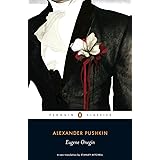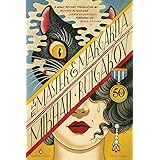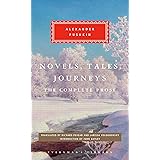
Download the free Kindle app and start reading Kindle books instantly on your smartphone, tablet, or computer - no Kindle device required.
Read instantly on your browser with Kindle for Web.
Using your mobile phone camera - scan the code below and download the Kindle app.

OK
A Hero of Our Time MP3 CD – Audiobook, January 1, 2018
THE HEART OF A RUSSIAN
CHAPTER I
I was travelling post from Tiflis.
All the luggage I had in my cart consisted of one small portmanteau half filled with travelling-notes on Georgia; of these the greater part has been lost, fortunately for you; but the portmanteau itself and the rest of its contents have remained intact, fortunately for me.
As I entered the Koishaur Valley the sun was disappearing behind the snow-clad ridge of the mountains. In order to accomplish the ascent of Mount Koishaur by nightfall, my driver, an Ossete, urged on the horses indefatigably, singing zealously the while at the top of his voice.
What a glorious place that valley is! On every hand are inaccessible mountains, steep, yellow slopes scored by water-channels, and reddish rocks draped with green ivy and crowned with clusters of plane-trees. Yonder, at an immense height, is the golden fringe of the snow. Down below rolls the River Aragva, which, after bursting noisily forth from the dark and misty depths of the gorge, with an unnamed stream clasped in its embrace, stretches out like a thread of silver, its waters glistening like a snake with flashing scales.
Arrived at the foot of Mount Koishaur, we stopped at a dukhan. 1 About a score of Georgians and mountaineers were gathered there in a noisy crowd, and, close by, a caravan of camels had halted for the night. I was obliged to hire oxen to drag my cart up that accursed mountain, as it was now autumn and the roads were slippery with ice. Besides, the mountain is about two versts 2 in length.
There was no help for it, so I hired six oxen and a few Ossetes. One of the latter shouldered my portmanteau, and the rest, shouting almost with one voice, proceeded to help the oxen.
- LanguageEnglish
- PublisherIDB Productions
- Publication dateJanuary 1, 2018
- ISBN-101776747895
- ISBN-13978-1776747894
Books with Buzz
Discover the latest buzz-worthy books, from mysteries and romance to humor and nonfiction. Explore more
Similar items that may ship from close to you
Product details
- Publisher : IDB Productions (January 1, 2018)
- Language : English
- ISBN-10 : 1776747895
- ISBN-13 : 978-1776747894
- Item Weight : 3.5 ounces
- Best Sellers Rank: #7,063,918 in Books (See Top 100 in Books)
- #69,507 in Books on CD
- #170,884 in World History (Books)
- Customer Reviews:
About the authors

Vladimir Vladimirovich Nabokov was born on April 23, 1899, in St. Petersburg, Russia. The Nabokov household was trilingual, and as a young man, he studied Slavic and romance languages at Trinity College, Cambridge, taking his honors degree in 1922. For the next eighteen years he lived in Berlin and Paris, writing prolifically in Russian under the pseudonym Sirin and supporting himself through translations, lessons in English and tennis, and by composing the first crossword puzzles in Russian. In 1925 he married Vera Slonim, with whom he had one child, a son, Dmitri. Having already fled Russia and Germany, Nabokov became a refugee once more in 1940, when he was forced to leave France for the United States. There he taught at Wellesley, Harvard, and Cornell. He also gave up writing in Russian and began composing ficticvbn ral books of criticism. Vladimir Nabokov died in Montreux, Switzerland, in 1977.

Marian Schwartz translates Russian classic and contemporary fiction, history, biography, criticism, and fine art. She is the principal English translator of the works of Nina Berberova and translated the New York Times’ bestseller The Last Tsar, by Edvard Radzinsky, as well as classics by Mikhail Bulgakov, Ivan Goncharov, Yuri Olesha, Mikhail Lermontov, and Leo Tolstoy. Her most recent publications are Polina Dashkova's Madness Treads Lightly, Aleksandr Solzhenitsyn's March 1917: The Red Wheel, Node III, Book 1, and Leonid Yuzefovich’s Horsemen of the Sands. She is a past president of the American Literary Translators Association and the recipient of two National Endowment for the Arts translation fellowships and numerous prizes, including the 2014 Read Russia Prize for Contemporary Russian Literature, the 2016 Soeurette Diehl Frasier Award from the Texas Institute of Letters, and the 2018 Linda Gaboriau Award for Translation from the Banff Centre for Arts and Creativity. https://www.marianschwartz.com/

Discover more of the author’s books, see similar authors, read author blogs and more

Discover more of the author’s books, see similar authors, read author blogs and more
Customer reviews
Customer Reviews, including Product Star Ratings help customers to learn more about the product and decide whether it is the right product for them.
To calculate the overall star rating and percentage breakdown by star, we don’t use a simple average. Instead, our system considers things like how recent a review is and if the reviewer bought the item on Amazon. It also analyzed reviews to verify trustworthiness.
Learn more how customers reviews work on AmazonReviews with images
-
Top reviews
Top reviews from the United States
There was a problem filtering reviews right now. Please try again later.
The account is a fairly simple one, a fact which engenders much of its appeal -- here we have an exceptional novel of historical fiction: A Russian Army officer (Pechorin) is assigned to the Caucasus Mountain region military forces where the Russians and their often tenuous Cossack allies are engaged in a partisan conflict against their Islamic adversaries, principally the Chechens. Pechorin's saga is at times conveyed directly and sometimes by either of two specific narrators, (which has yielded a shrewd literary conveyance by Lermontov.)
The reader learns little of the actual war but of Pechorin's unusual personal experiences and of period Caucasus societies' cultural proclivities we reap a bountiful harvest. Love, duels, corruption, robbery, murder, treachery, gambling, voyages, heroics, and social gala are all facets of this arresting tale. An environment of festive social events, such as dances, especially at the region's medicinal spring resorts but still at the nucleus of a brutal military campaign, might surprise some readers. But these episodes lend a notable enhancement and backdrop to the overall story, much as they do in Tolstoy's War and Peace or in Dostoyevsky's The Brothers Karamazov .
Lermontov abruptly kills off key principal characters in the joyful spirit of John O'Hara, ( Appointment In Samarra Butterfield 8 Hope Of Heaven ) if I might be permitted that anachronism... or perhaps the reverse is more likely true. And Lermontov's wry and darkly witty dialogues will appeal mightily to contemporary readers of this 1840 work:
"'Carefully we carried the wounded girl to Pechorin's quarters and sent for the doctor. Although he was drunk, he came, examined the wound, and announced that she could not live more than one day; only he was......'
'She recovered?' I asked the junior captain, grasping him by the arm and involuntarily feeling glad.
'No,' he answered, 'the doctor's mistake was that she lived two days.'"
(Page 51.)
While the account is told from a sequence of diverging perspectives, the entirety of the tale has been fit together from five mini-stories, (much as one encounters in Wilke Collins' The Moonstone (Modern Library Classics) , or in Sara Jeanette Duncan's The Pool in the Desert .) This is also the same sort of Russian literary journey as we joyfully read in Enchanted Wanderer (Lyeskov), Fathers and Sons (Turgenev), and The Cossacks (Tolstoy.) In Lermontov's book, truth is stranger than fiction and there are scores of underlying truths found throughout this extraordinary fictional work. It's certainly no fairy tale but a magical sort of atmosphere does covertly blossom from Lermontov's praiseworthy locution.
The notion of Pechorin being "a hero of our time" achieves a dual end: it lauds this purely satirical book title, and this proclamation (in the context of the story) serves to illustrate a great deal about the era, the region, and the singular societies in which Pechorin existed and subsequently embarked upon during his remarkable and sundry pursuits.
I did wish to point out to prospective buyers just a few unusual peculiarities regarding the "Everyman's Library" edition (© 1992) of this book.
First and foremost, this translation by Vladimir and Dmitri Nabokov is artfully conveyed -- the reader will find it smooth sailing. However, and I make this comment in some bewilderment coupled with all personal humility, it appears to me that the Nabokovs failed to fully grasp the more diminutive nuances of the very book that they were translating!
How did I arrive at this conclusion? The foreword by the Nabokovs expresses a less-than-lukewarm enthusiasm for this outstanding literary work. And to compound this anomaly, their confused and long-winded commentary, which casts Lermontov's writing style and delivery in a negative light, is in itself as inarticulate as it is unjustifiably reproachful of the author. We encounter a pernicious crescendo to all this as the Nabokovs apparently regard their own (subjective) assessments of the work as absolute - they go along further in perceptibly degrading the views of other critics which, from their lofty view, ostensibly amounts to nothing at all worthwhile. This clumsy assertion in the Translator's Foreword [the reader is not actually informed which translator wrote it] exemplifies a number of similarly inelegant entries:
"In the worst story of the book, `Taman' (deemed by some Russian critics the greatest, for reasons incomprehensible to me), Yanko is saved from utter banality when we notice that the connection between him and the blind lad is a pleasing echo of he [sic] scene between hero and hero-worshipper in `Maksim Maksimych'."
(Page 11 -- The parenthetical jab above comes directly from the Nabokovs, not me.)
The translators also launch into some tactlessly chosen comments in their Endnotes, (which, by the way, are only intermittently helpful), which more or less fall into a vague category which might be adequately characterized as "condescending remarks." Some of these observations have little or nothing whatever to do with Lermontov's text and can only serve to stroke the translators' egos - here are two clear examples:
"[Endnote] 124. `Otdelyayushchei,' `otdelyayushcheisya'. It is just like Lermontov and his casual style to let this long and limp word appear twice in the same, final, sentence."
(Page 186 -- Only the English equivalents of these words actually appear in the text.),
and,
"[Endnote] 54. The allusion is to `La Femme de Trente Ans' in `Scènes de la Vie Privèe 1828-44,' a vulgar novelette, ending in ridiculous melodrama, by the overrated French writer, Balzac."
(Page 180.)
Is Balzac overrated? I could not begin to judge this contention one way or another but the Endnote comment in this instance clearly has no relevance to Lermontov directly or to his writings and was thus unnecessary and unfortunate at the least.
But these semi-elitist remarks and unmerited criticisms do not actually embody my chief concern: the translators infer in their Foreword and/or in the Endnotes that Lermontov occasionally made locution mistakes and errors of either logic or fact. They additionally insinuate that he plagiarized here and there which is entirely untrue. Awarding credit where it is due, it's providential that the Nabokovs translated Lermontov's work literally enough that I entirely understood what the author was (alternatively) obliquely, symbolically, metaphorically, and shrewdly imparting in each of these instances, even if the translators apparently did not.
This edition also includes an Introduction by T.J. Binyon. Other than the biographical background on Lermontov which it provides I did not find this digest to be particularly coherent either. For some unaccountable reason, the instant critiques of this work, (which was Lermontov's Magnum opus), seem to have inspired an exaggeration of perceived "mistakes," and/or "shoddy writing." Based upon my own encounter in reading the story, nothing could be further from the truth.
So to summarize this facet of my review, I most emphatically recommend that folks skip past the Translator's Foreword, the Endnotes, and Binyon's Introduction until after they have concluded their reading of Lermontov's story, all of which I feel that most booklovers will find to be as lucid an account as it is delightful. But do not fail to read the "Author's Introduction" which is the very antithesis of the other commentaries, delivering a witty bulwark of charm in its merciful brevity!
In Lermontov's wonderful tale we glean an insight into a region, an era, and into cultures about which, regrettably, so little has been written. This is a straightforward read that almost anyone can enjoy. You'll also find, as they exist in all post-1991 "Everyman's Library" editions, a mini-biography, a chronology of historical events, and a literary context outline, as it applies (in this case) to Mikhail Lermontov. Even given my tepid critique of both the Nabokovs' and T.J. Binyon's contributions (the Nabokovs' artful translation into English from the Russian excepted) I can still favorably recommend this nicely-bound edition.
It was the Caucasus themselves that were the final catalyst for reading Lermontov’s classic and widely influential novel. Also, the social customs in the spa town of Pyatigorsk, with the mountains dramatically in the background. I’ve been fascinated by such towns due to my annual pilgrimages to Aix les Bains, a two-day stop over, caused by the “decalage” of weekends between Saudi Arabia and France.
Lermontov, billed as the “poet of the Caucasus,” and the second greatest poet after Pushkin, died young, at the age of 26, in 1841. He died in a duel, ironically much as was depicted in this novel, proving, once again, that youth really is not “bullet-proof.” He was a central figure in the Romantic Movement, “married to a hefty volume of Byron.” One has to wonder how many extra points his reputation acquired due to his dramatic exit in one of human being’s dumber rituals, as in, “you insulted my honor… I demand satisfaction… at six or twelve paces… etc.” Lermontov had been previously disciplined for his role in a duel with the son of the French ambassador.
For the Russians, the Caucasus had the flavor of the “wild American west.” The scenery was in such contrast to the endless Russian steppe, with more than a passing resemblance to the Rockies. It was a standard assignment for Russian officers, as depicted in the novel, since they were attempting to “pacify” those seemingly always obstreperous native tribes (something that is still going on today).
Grigori Aleksandrovich Pechorin, an alter-ego for Lermantov, is “the hero.” To get there, the author uses the literary device of a story within a story, as travelers are attempting to cross through the mountains. Maksim Maksimych narrates the story of Pechorin, and he passes it off as his own, once Pechorin’s diaries were found, after he died in a trip to Persia. For me, I found the device a bit tortuous.
Bela, who is a Circassian, and therefore Muslim, as well as the daughter of a prince is “acquired” by Pechorin in a horse deal. Hum. Time honored traditions of the spoils of military conquest. But jealously will lead to her loss. Soon we are into the descriptions of the rituals and rivalries of society in Pyatigorsk, a pale foreshadowing of Proust’s classic work, almost a century later. Princess Ligovski, 45, from Moscow, is taking the airs, as it were, with daughter Princess Mary. Grushnitski, a wounded “war hero,” age 21, is Pechorin’s rival for her affection, leading to the seemingly inevitable duel. Unlike in real life, in the novel, the alter-ego wins.
A plausibly written story about a particular clash of cultures, both external and internal to Russia. The climactic moments involve a duel, a ritual that makes me want to scream over its stupidity, but alas, seems to be an engrained part of the human condition, continued on today in some less dramatically lethal forms. And for its place in Russian literature, if not Stalin’s speech, 4-stars.
Top reviews from other countries
Mikhail Lermontov Penguin Classics ISBN 978-0 -14 -310563-3
Introduction and translation by Natasha Randall
Superb, 169 pages – read it in one sitting – a must read if you wish to understand the Russian and their nation’s influence on this part of the Asian expanse. Here from the Georgian heights one can view across the Black Sea to the Crimea where currently in 2014 political unrest mounts.
.
The novel set in the 1830’s harvests the author’s experiences on the frontier lands of the Caucasus. Lermontov introduces his hero – Grigory Alexandrovich Pechorin. To be a hero you need to face danger: danger on the frontier. And there are other dangers - what about danger through a social cut; a duel, danger through a game of gambling? Lermontov’s hero threads a path through dangers web. Sometimes outcomes are written in the sky. Fate or perhaps a little manipulation may be of help.
Research – 9/10 a feast of leads geographical, political and world literature. On the periphery - the duel, Russian army, peoples of the Caucasus and the Rus’ an ancient people represented by the Belarusian, Ukrainian, and Russian peoples and their territories.
Prose – 8/10 thrilling pace.
Politics/History 7/10 Lermontov’s poem ‘Death of a Poet’ brought the author into opposition with Czar Nicholas 1. Restraint rules this novel – the Czar remained vitriolic.
Danger – 10/10 a hero needs danger and the danger here provides at least 5 wows for me.
Chase – 10/10 I could not put this book down which says a great deal for Natasha’s translation and the fact that as Natasha says: ‘his is a feat of narrative, a romping story about a dislikable man who captures your whole attention with his manifold contradictions.’
Humour/Poetry - loved the Circassian Kasbich’s poem.
A truly great book lures the reader back again and again. My research on the femme fatale and Balakirev’s composition on Princess Tamara -who lures travellers to her castle above the River Terek - led me to Lermontov. I was expectant, and wanted to read his description of the river site. In Lermontov’s text he rushes through the gorge: I will spare you from…. any description! Quel surprise!
Damn a failed research lead I thought. Yet the text offered rich alternatives and danger.
And so to the question posed at the start of the novel – how do I make my cart go faster? A leitmotiv for the State perhaps? Well it’s not just the Russian who interferes, meddles and seeks advantage. It’s the outcome, after the manipulation that is important. Beware - the outcome is certain if you play Lermontov’s version of Russian roulette. Quel Danger!
This book has secured a place in my library – I recommend this version of Lermontov’s ‘A Hero of our Time.’













